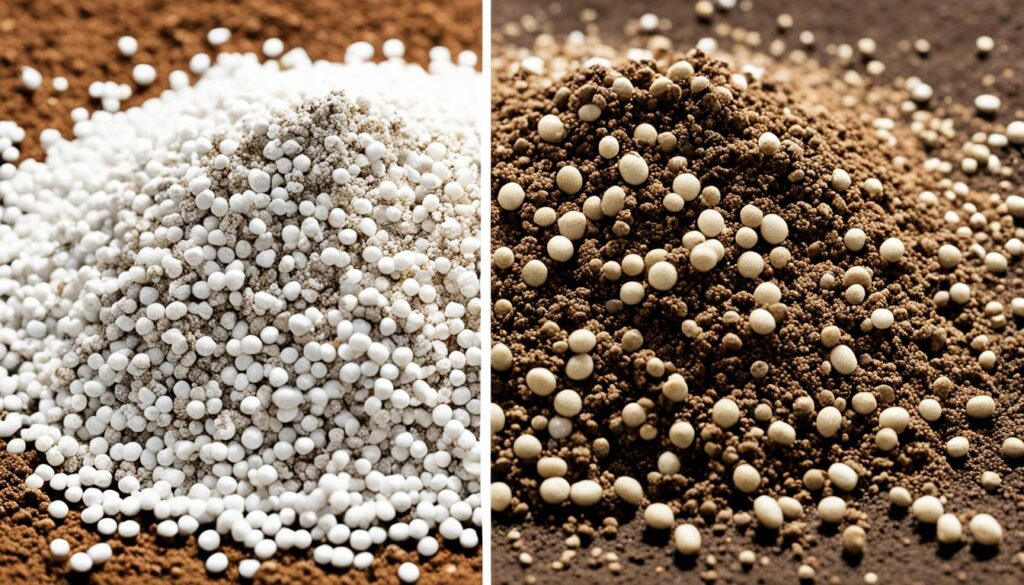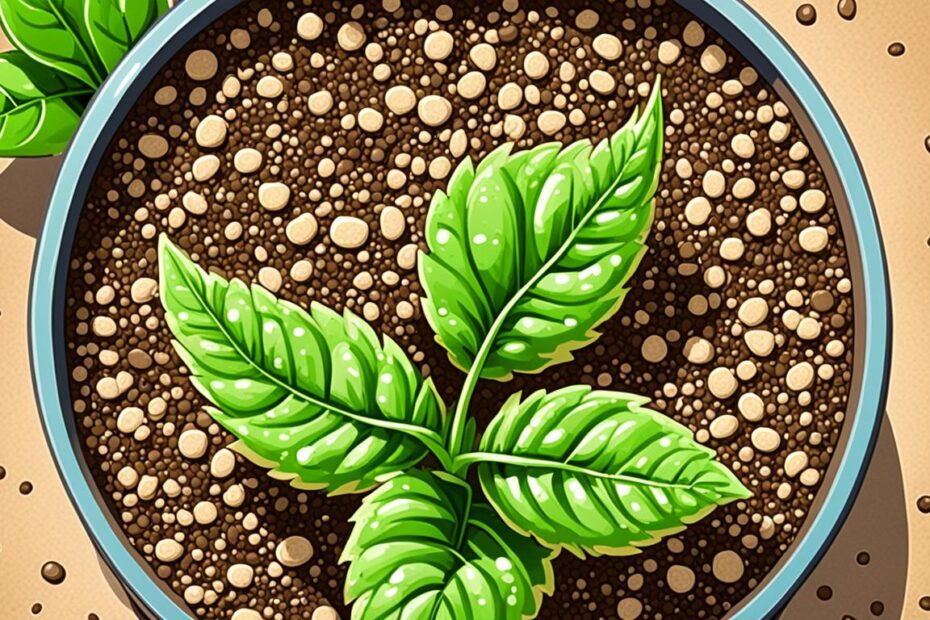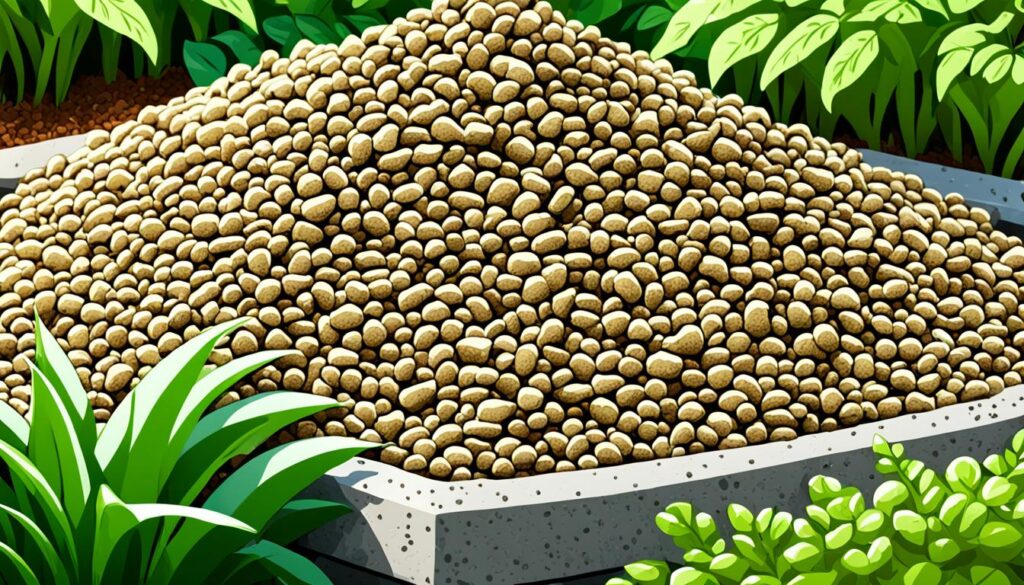Are you looking for a natural wonder that can revolutionize your gardening experience? Look no further than vermiculite soil. This lightweight and non-toxic mineral has the power to transform your plants’ growth and enhance your garden’s vitality. But what exactly is vermiculite soil, and how can it benefit your gardening endeavors? Let’s dive in and explore the fascinating world of vermiculite.
Key Takeaways:
- Vermiculite soil is a naturally occurring mineral that expands when heated.
- It absorbs water and attracts plant nutrients, making it ideal for propagation and potting up plants.
- Vermiculite soil is different from perlite and provides unique advantages in gardening.
- When used correctly, vermiculite can unlock the growth potential of your plants and improve overall garden health.
- Understanding the uses, differences, and safety precautions of vermiculite soil is essential for maximizing its benefits.
How to Use Vermiculite in Gardening: Tips and Techniques
Vermiculite is a versatile soil additive that offers numerous benefits for gardening enthusiasts like you. Whether you’re a seasoned gardener or just starting out, incorporating vermiculite into your gardening routine can enhance plant growth and improve overall garden health. Here are some tips and techniques on how to use vermiculite effectively:
1. Seed Sowing:
When it comes to seed sowing, vermiculite can be used in different ways. You can use it as a standalone medium for sowing seeds or blend it with seed sowing compost to create a lightweight and nutrient-rich mixture. Additionally, vermiculite is excellent for covering seed trays to help retain moisture and prevent damping off, a common fungal disease that affects young seedlings.
2. Pricking Out and Potting On:
Vermiculite is ideal for pricking out and potting on seedlings. Its lightweight and moisture-retaining properties make it an excellent choice for transitioning young plants into larger containers. By adding vermiculite to your potting mix, you’ll improve moisture retention, prevent compaction, and provide a conducive environment for healthy root development.
3. Rooting Cuttings:
If you enjoy propagating plants through cuttings, vermiculite can be a game-changer. Its moisture-absorbing capacity and ability to retain oxygen create the perfect environment for rooting cuttings. Simply dip the cuttings into a rooting hormone, place them in vermiculite, and monitor their progress. Soon, you’ll have a new generation of plants to beautify your garden.
4. House Plant Care:
Don’t forget about your beloved house plants! Adding vermiculite to the compost of your house plants can work wonders. It helps retain moisture, preventing the soil from drying out too quickly. Additionally, vermiculite improves aeration and prevents soil compaction, allowing roots to thrive. For the best results, mix equal parts of house plant compost and vermiculite to create the ideal growing environment.
Remember, vermiculite and perlite are two different soil additives with distinct characteristics and uses. While vermiculite focuses on moisture retention, perlite enhances drainage in potting mixes. By selecting the right additive for your gardening needs, you’ll ensure optimal plant health and growth.
So, unleash the power of vermiculite in your gardening endeavors and witness the transformative effects it can have on your plants. Whether it’s seed sowing, pricking out, rooting cuttings, or taking care of your house plants, vermiculite is a trusted ally for every gardening enthusiast.
| Gardening Technique | Benefits of Vermiculite |
|---|---|
| Seed Sowing | Promotes moisture retention and prevents damping off |
| Pricking Out and Potting On | Improves moisture retention, prevents compaction, and supports healthy root development |
| Rooting Cuttings | Creates an ideal rooting environment with moisture retention and oxygenation |
| House Plant Care | Enhances moisture retention, prevents soil drying, and improves aeration |
Vermiculite vs. Perlite: Choosing the Right Soil Additive
When it comes to soil additives, vermiculite and perlite are popular choices. Each additive offers unique benefits that can enhance your gardening experience and promote healthy plant growth. Understanding the differences between vermiculite and perlite will help you choose the right soil additive for your specific gardening needs.
Vermiculite: Water Retention and Nutrient Attraction
Vermiculite is an excellent choice for gardeners who want to improve water retention and promote nutrient absorption in their soil. This natural mineral has the ability to hold water and nutrients, making it ideal for plants that require consistent moisture to thrive. By incorporating vermiculite into your soil, you can ensure that your plants have access to water and essential nutrients, even in dry or arid climates.
Furthermore, vermiculite provides an added benefit of protection against damping-off and fungal diseases. Its moisture-retaining properties create an environment that discourages the growth of harmful pathogens, allowing your plants to flourish.
Perlite: Drainage and Free-Draining Potting Compost
If you are looking to improve drainage and create a free-draining potting compost, perlite is the ideal soil additive for you. Perlite is a volcanic glass that is heated and expanded to create lightweight, porous particles. These particles help to aerate the soil, allowing excess water to drain away, preventing root rot and waterlogged conditions.
Perlite is especially beneficial for plants that require excellent drainage, such as cacti and succulents. By incorporating perlite into your potting mix, you can create a well-draining environment that mimics the natural conditions these plants thrive in.
Combining Vermiculite and Perlite
While vermiculite and perlite have different characteristics, they can also complement each other when added to soil. By combining vermiculite and perlite, you can create a balanced soil mix that retains moisture while ensuring adequate drainage. This combination is particularly useful for container gardening, where maintaining the right balance of water retention and drainage is essential for healthy plant growth.
To create a successful soil mix, consider the specific needs of your plants. For plants that require more moisture, use a higher proportion of vermiculite in the mix. For plants that require better drainage, increase the amount of perlite. Adjusting the ratio of vermiculite and perlite in your soil mix will help you create an ideal environment for your plants to thrive.

Is Vermiculite Safe to Use in Gardening?
Vermiculite is a versatile soil additive that is commonly used in gardening. Many gardeners wonder if it is safe to use, considering the potential risks associated with certain minerals. Overall, vermiculite is generally safe to use in gardening and poses no significant risks when used correctly.
First and foremost, it is crucial to understand that vermiculite is mined according to industry protocols, ensuring its quality and safety. It is a naturally occurring mineral that undergoes processing to expand and create the lightweight, porous structure that makes it an excellent soil amendment.
However, there has been a specific case that raised concerns about vermiculite contamination. In Libby, Montana, USA, a mine produced vermiculite that contained asbestos minerals, leading to contamination. This mine was operated by the Zonolite company and closed in 1990. The asbestos contamination in the Libby mine is an exceptional situation and not representative of the entire industry.
“It’s important to highlight that the Libby mine in Montana was unique, and the majority of commercially available vermiculite poses no health risks when used in gardening.”
To ensure safe gardening practices, it is advisable to take basic precautions when handling vermiculite. Wearing gloves is recommended to minimize direct contact and prevent any potential irritation. Additionally, it is essential to store vermiculite separately from weedkillers and other garden chemicals to prevent any cross-contamination.
By following these simple safety guidelines, you can confidently incorporate vermiculite into your gardening routine without any concerns.
Remember, vermiculite is an incredibly useful soil additive that enhances water retention, improves nutrient availability, and creates a favorable environment for plant growth. Its benefits far outweigh any potential risks when used responsibly.
Next, let’s explore the conclusion and understand why embracing the benefits of vermiculite can elevate your gardening game.
| Is Vermiculite Safe to Use in Gardening? | Safety Precautions |
|---|---|
| Yes, vermiculite is generally safe to use in gardening. | – Wear gloves when handling vermiculite. – Store vermiculite away from weedkillers and garden chemicals. |
Conclusion: Embrace the Benefits of Vermiculite Soil
Vermiculite soil is a true game-changer for any gardener looking to amplify their gardening skills. With its unique properties, this versatile soil additive can revolutionize your plant growth and elevate your gardening game.
The ability of vermiculite soil to retain water and attract essential nutrients ensures that your plants receive optimal hydration and nourishment. This translates into healthier and more vibrant growth for your garden. Whether you’re sowing seeds, caring for house plants, or nurturing cuttings, vermiculite soil is the secret ingredient that accelerates your gardening success.
While exploring the wonders of vermiculite soil, it’s crucial to know the differences between vermiculite and perlite, another popular soil additive. Understanding their unique characteristics allows you to make informed decisions about which additive best suits your gardening needs. Furthermore, practicing safety precautions, such as wearing gloves during handling and storing vermiculite away from harmful garden chemicals, ensures a safe and enjoyable gardening experience.
Unlock the full potential of your plants with vermiculite soil and witness extraordinary growth and productivity. Incorporate this valuable soil additive into your gardening routine, and watch as your plants thrive in a nurturing environment. Embrace the benefits of vermiculite soil and take your gardening journey to new heights.
FAQ
What is vermiculite soil?
Vermiculite soil is a naturally occurring mineral that expands when heated, forming long strands resembling small worms. It is lightweight, non-toxic, and sterile, making it an excellent soil additive for gardening.
How can I use vermiculite in gardening?
Vermiculite can be used for various gardening purposes, such as seed sowing, pricking out and potting on seedlings, rooting cuttings, and enhancing the compost of house plants.
What are the differences between vermiculite and perlite?
Vermiculite and perlite are both soil additives, but they have different properties. Vermiculite retains water and nutrients, making it suitable for plants that require more moisture. Perlite improves drainage and is ideal for plants that need good drainage.
Is vermiculite safe to use in gardening?
Generally, vermiculite is safe to use in gardening. However, it is important to ensure that the vermiculite you purchase is mined according to industry protocols and not contaminated with asbestos minerals.
What are the benefits of vermiculite soil?
Vermiculite soil has many benefits, including water retention, nutrient attraction, and insulation. It can improve plant growth, enhance soil properties, and contribute to overall garden health.

